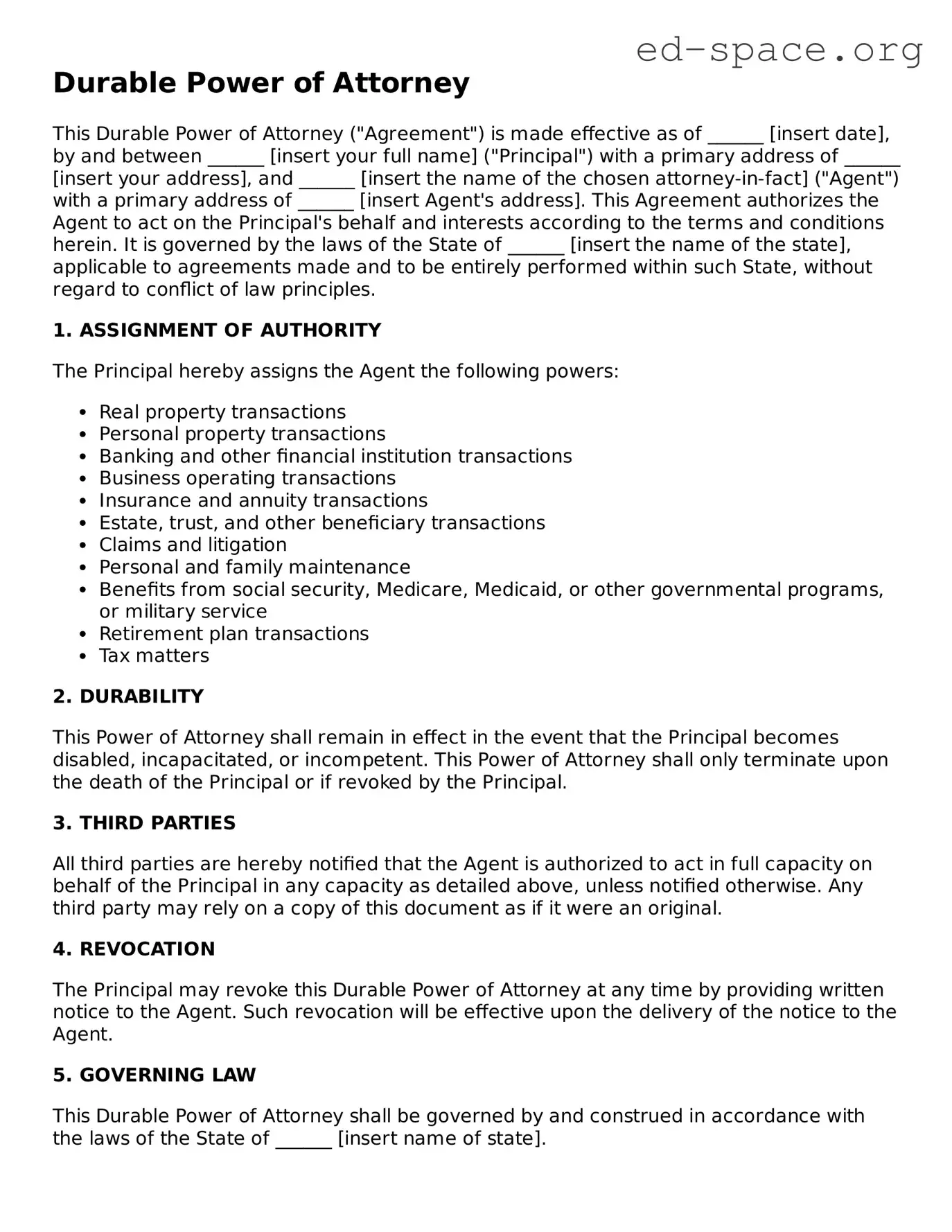Durable Power of Attorney
This Durable Power of Attorney ("Agreement") is made effective as of ______ [insert date], by and between ______ [insert your full name] ("Principal") with a primary address of ______ [insert your address], and ______ [insert the name of the chosen attorney-in-fact] ("Agent") with a primary address of ______ [insert Agent's address]. This Agreement authorizes the Agent to act on the Principal's behalf and interests according to the terms and conditions herein. It is governed by the laws of the State of ______ [insert the name of the state], applicable to agreements made and to be entirely performed within such State, without regard to conflict of law principles.
1. ASSIGNMENT OF AUTHORITY
The Principal hereby assigns the Agent the following powers:
- Real property transactions
- Personal property transactions
- Banking and other financial institution transactions
- Business operating transactions
- Insurance and annuity transactions
- Estate, trust, and other beneficiary transactions
- Claims and litigation
- Personal and family maintenance
- Benefits from social security, Medicare, Medicaid, or other governmental programs, or military service
- Retirement plan transactions
- Tax matters
2. DURABILITY
This Power of Attorney shall remain in effect in the event that the Principal becomes disabled, incapacitated, or incompetent. This Power of Attorney shall only terminate upon the death of the Principal or if revoked by the Principal.
3. THIRD PARTIES
All third parties are hereby notified that the Agent is authorized to act in full capacity on behalf of the Principal in any capacity as detailed above, unless notified otherwise. Any third party may rely on a copy of this document as if it were an original.
4. REVOCATION
The Principal may revoke this Durable Power of Attorney at any time by providing written notice to the Agent. Such revocation will be effective upon the delivery of the notice to the Agent.
5. GOVERNING LAW
This Durable Power of Attorney shall be governed by and construed in accordance with the laws of the State of ______ [insert name of state].
6. ACKNOWLEDGMENT BY PRINCIPAL
I, ______ [insert your name], the Principal named in this Durable Power of Attorney, hereby acknowledge that I have read and understand the nature and purpose of this document. I sign this document freely and voluntarily, granting the powers specified herein to the named Agent.
______________________
Principal's Signature
______________________
Date
7. ACCEPTANCE BY AGENT
I, ______ [insert name of Agent], hereby accept the designation as Attorney-in-Fact under this Durable Power of Attorney. I understand the responsibilities and duties under this role and agree to act in the Principal's best interests and in accordance with the powers granted herein.
______________________
Agent's Signature
______________________
Date
8. WITNESS DECLARATION
State of ______ [insert name of state]
County of ______ [insert name of county]
On this day, ______ [insert date], before me, ______ [insert name of notary], personally appeared ______ [insert name of Principal] and ______ [insert name of Agent], known to me (or satisfactorily proven) to be the persons whose names are subscribed to the within instrument, and acknowledged that they executed the same for the purposes therein contained.
In witness whereof, I hereunto set my hand and official seal.
______________________
Notary Public
My Commission Expires: ______
